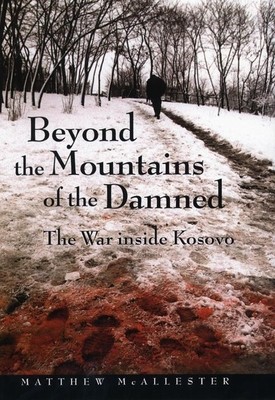
- We will send in 10–14 business days.
- Author: Matthew Mcallester
- Publisher: New York University Press
- ISBN-10: 0814756603
- ISBN-13: 9780814756607
- Format: 16.1 x 23.5 x 2.1 cm, hardcover
- Language: English
- SAVE -10% with code: EXTRA
Reviews
Description
Winner, Publishers Weekly Best Books of 2002, Non-Fiction For every survivor of a crime, there is a criminal who forces his way into the victim's thoughts long after the act has been committed. Reporters weren't allowed into Kosovo during the war without the permission of the Yugoslavian government but Matthew McAllester went anyway. In Beyond the Mountains of the Damned he tells the story of Pec, Kosovo's most destroyed city and the site of the earliest and worst atrocities of the war, through the lives of two menone Serb and one Kosovar. They had known each other, and been neighbors for years before one visited tragedy on the other. With a journalist's eye for detail McAllester asks the great question of war: What kind of men could devastate an entire city, killing whole families, and feel no sense of guilt? The answer lies in the culture of gangsterism and ethnic hatred that began with the collapse of Yugoslavia. In March of 1999, the world watched thousands of Albanian refugees pour out of Kosovo, carrying stories of the terror that drove them from their homes. To Isa Bala and his family, Albanian Muslims who stayed in Pec during the NATO bombardment, the war in Kosovo was not about cruise missiles and geopolitics. It was about tiptoeing between survival and death in the town that saw the fiercest destruction, the most thorough eviction of the Albanian population and killings whose brutality demands explanation. To Nebojsa Minic and other Serb militiamen who ruled with murder, the conflict was about the exercise of power. Today they are alive and well in the new Yugoslavia. So unconcerned are they over the prospect of ever being held accountable for their crimes that they were willing to sit down over coffee after the war and discuss in detail their brief, brutal reign.
EXTRA 10 % discount with code: EXTRA
The promotion ends in 10d.13:23:14
The discount code is valid when purchasing from 10 €. Discounts do not stack.
- Author: Matthew Mcallester
- Publisher: New York University Press
- ISBN-10: 0814756603
- ISBN-13: 9780814756607
- Format: 16.1 x 23.5 x 2.1 cm, hardcover
- Language: English English
Winner, Publishers Weekly Best Books of 2002, Non-Fiction For every survivor of a crime, there is a criminal who forces his way into the victim's thoughts long after the act has been committed. Reporters weren't allowed into Kosovo during the war without the permission of the Yugoslavian government but Matthew McAllester went anyway. In Beyond the Mountains of the Damned he tells the story of Pec, Kosovo's most destroyed city and the site of the earliest and worst atrocities of the war, through the lives of two menone Serb and one Kosovar. They had known each other, and been neighbors for years before one visited tragedy on the other. With a journalist's eye for detail McAllester asks the great question of war: What kind of men could devastate an entire city, killing whole families, and feel no sense of guilt? The answer lies in the culture of gangsterism and ethnic hatred that began with the collapse of Yugoslavia. In March of 1999, the world watched thousands of Albanian refugees pour out of Kosovo, carrying stories of the terror that drove them from their homes. To Isa Bala and his family, Albanian Muslims who stayed in Pec during the NATO bombardment, the war in Kosovo was not about cruise missiles and geopolitics. It was about tiptoeing between survival and death in the town that saw the fiercest destruction, the most thorough eviction of the Albanian population and killings whose brutality demands explanation. To Nebojsa Minic and other Serb militiamen who ruled with murder, the conflict was about the exercise of power. Today they are alive and well in the new Yugoslavia. So unconcerned are they over the prospect of ever being held accountable for their crimes that they were willing to sit down over coffee after the war and discuss in detail their brief, brutal reign.


Reviews